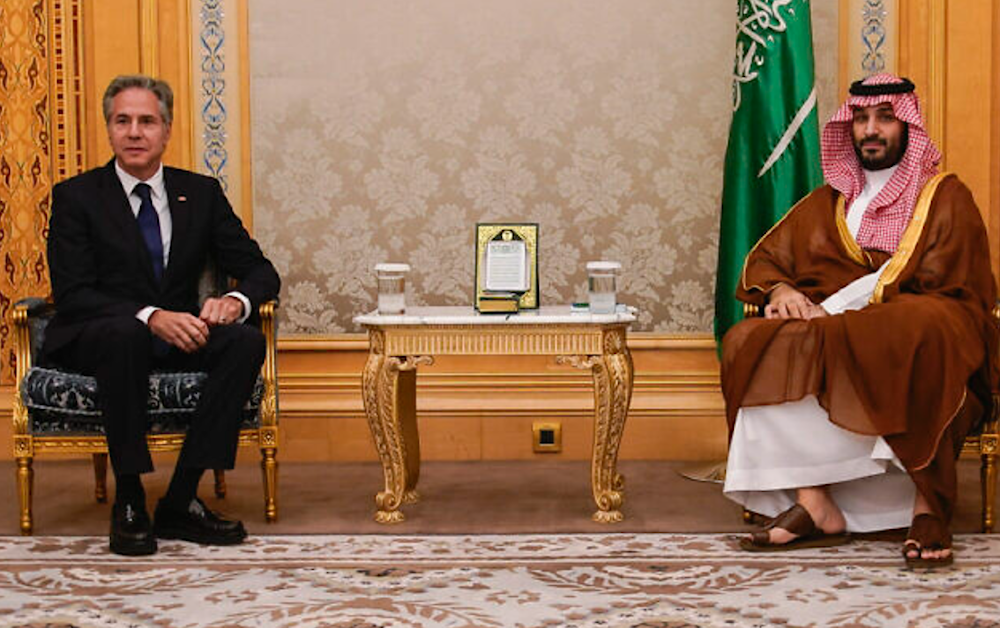Saudi Arabia drops pursuit of US Defense pact over 'Israel' stalemate
Reportedly, Saudi Arabia has reconsidered its position on Palestinian statehood, suggesting that "Israel's" commitment to a two-state solution could lead to normalization.
-

US Secretary of State Antony Blinken meets Saudi Crown Prince Mohammed bin Salman in Riyadh, Saudi Arabia on October 23, 2024. (AP)
To finalize a comprehensive mutual security pact earlier this year, Riyadh altered its stance on Palestinian statehood, informing Washington that "Israel's" public commitment to a two-state solution may be enough for the Gulf kingdom to normalize relations.
However, with public outrage in Saudi Arabia and the wider Middle East over the genocide in Gaza, Crown Prince Mohammed bin Salman (MBS) may have once again made "Israel's" recognition conditional on it taking concrete steps to establish a Palestinian state, two Saudi and four Western sources told Reuters.
According to Western officials, Israeli Prime Minister Benjamin Netanyahu is eager to achieve normalization with the Saudi kingdom but faces domestic opposition to any concessions to Palestinians and is aware that any move toward Palestinian statehood will shatter his ruling coalition.
Riyadh and Washington are aiming for a modest defense agreement before President Biden leaves office in January. This deal, which wouldn't require Senate approval, focuses on expanding joint military exercises and strengthening US-Saudi defense ties while limiting engagement with China.
It would encourage Saudi investment in new technology like drone defense, enhance US military support in Riyadh (including training and logistics), and possibly deploy a Patriot missile battalion to boost missile defense and deterrence. Full US-Saudi defense cooperation would require two-thirds majority in the US Senate, which would be impossible until Riyadh recognized "Israel," according to six sources.
Abdelaziz al-Sagher, chairman of Saudi Arabia's Gulf Research Institute, stated that Saudi Arabia will secure a security deal allowing more military cooperation and U.S. weapons sales, but not a full defense treaty like those of Japan or South Korea.
The situation is complicated by Donald Trump's possible return to the White House, as his Israeli-Palestinian "peace plan" does not include Palestinian statehood. US officials speaking to Reuters were uncertain whether Saudi Arabia wants to finalize the deal with Biden before January or wait for Trump.
Saudi authorities maintain that the establishment of a Palestinian state is in line with prior international agreements, and a necessary condition for long-term regional peace and security.
They say that without it, the cycle of violence will continue, jeopardizing any regular interactions.
One Saudi official questioned "How can we imagine a region integrated if we sidestep the Palestinian issue?" adding, "You can't prevent the Palestinian right to self-determination."
Despite MBS calling Israeli actions in Gaza a "collective genocide" in an address this month, it would seem as though a potential normalization could be revived when and if the war on Gaza ends and potentially under new Israeli administration.
According to Fawaz Gerges, a Middle East researcher at the London School of Economics, Trump would pursue every available route to achieve normalization, calling Saudi Arabia "the big prize" for Trump.
Gerges believes Trump could "promise a ceasefire in Gaza in return for normalization and tentative promise to support a Palestinian state," while allowing "Israel" to get away with not making "any real concessions" to the Palestinians."
Trump opposes Israeli 'annexation' of West Bank: Republican sources
Republican Party sources have revealed that President-elect Donald Trump is opposed to "Israel's" ambitions to "annex" the occupied West Bank.
According to the Israeli site Ynet News, a top Republican Senator close to the President-elect divulged last week that "Trump will not approve the annexation" of the West Bank.
The incoming president believes that such a step would be "a mistake for Israel" and would harm the occupation's international position, which has already been seriously harmed by the war on Gaza for over a year now.
Trump is also apparently concerned that any official "annexation" will further disrupt and derail efforts to achieve normalization between "Israel" and Saudi Arabia, which is a key priority for the incoming Trump administration, with Republican Senator Lindsey Graham working particularly hard on that goal.
The anonymous statements come after heightened speculation in recent weeks about Trump's nominations of pro-"Israel" officials in his future cabinet who support "West Bank annexation".

 4 Min Read
4 Min Read








